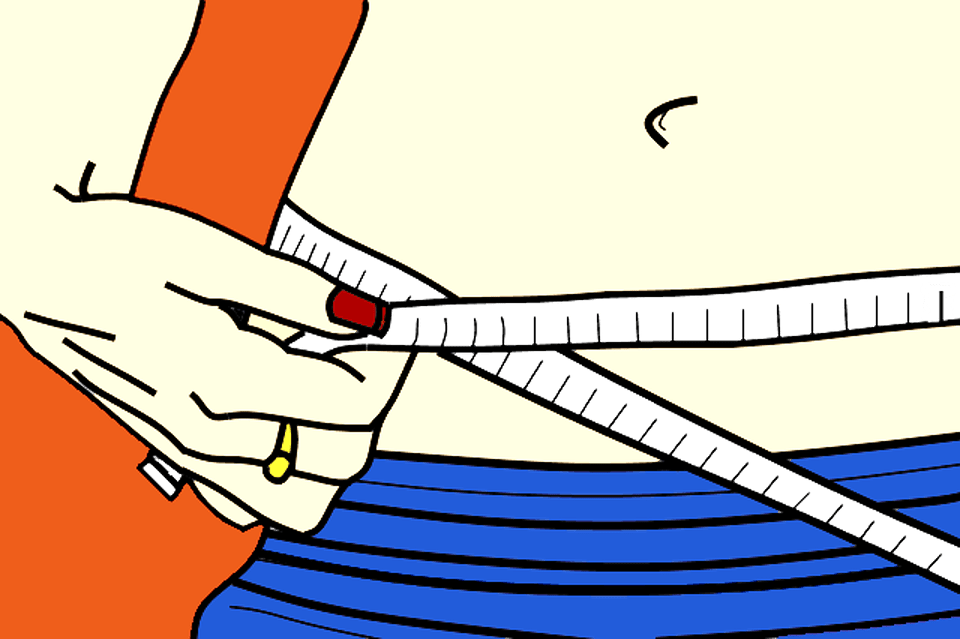
When you lose weight, your body fights back.
Losing a lot of weight at the beginning without much effort is possible, but then the weight loss may start to slow down or even stop.
According to this article, there are 17 possible explanations for why someone might not be losing weight, even if they are following a healthy diet and exercising regularly. Some of the reasons listed include not getting enough sleep, eating too many sugary or processed foods, not drinking enough water, and not tracking progress.
Maybe you are losing without realizing it
If you think you are not losing weight even though you are dieting, don’t worry yet.
The scale not moving for a few days (or weeks) is normal and doesn’t mean you’re not losing fat.
Body weight often changes by a few pounds depending on things like the type of food eaten and hormones, which can affect how much water the body retains (especially for women).
You can gain muscle and lose fat simultaneously, especially if you’ve started working out recently.
It is beneficial to lose body fat rather than simply weight.
You should use something other than the scale to measure your progress, for example your waist circumference or body fat percentage.
What you see in the mirror and how your clothes fit can be telling signs of your health.
If your weight has not been increasing for more than 1-2 weeks, you likely don’t have anything to worry about.
You’re not keeping track of what you’re eating
If you want to lose weight, it is important to be aware of how much you are eating. Many people are not aware of how much food they are consuming.
If you want to lose weight, it might help to write down what you eat or take pictures of your meals. That’s what some research suggests. A study found that people who kept food diaries or took food photos lost more weight than those who didn’t.
There are potential negative consequences to food tracking, particularly when it comes to weight loss. For people with eating disorders, calorie counting and food tracking can worsen potentially harmful symptoms.
You’re not eating enough protein
Protein is an important nutrient for losing weight.
If you eat protein making up 25-30% of your caloric intake, you can increase your metabolism by 80-100 calories per day. You will also be less inclined to snack throughout the day.
This is partly because of protein’s effects on hunger-regulating hormones, like ghrelin, and others.
Food experts recommend that if you eat breakfast, you should make sure that it is full of protein. This is because research has shown that people who eat a protein-rich breakfast are less likely to feel hungry later in the day and are less likely to have cravings.
A higher protein intake helps to prevent losing weight too quickly, as well as regaining weight.
You’ve been dieting for too long
If you’ve been trying to lose weight for a long time and you’re not seeing any results, you might want to take a break.
If you want to gain weight, you should eat more calories each day, get more sleep, and lift weights with the intention of getting stronger and adding more muscle.
The goal is to keep your body fat at the same level for 1 to 2 months before you start trying to lose weight.
You’re not lifting weights
It is important to do resistance training when losing weight as it helps to build muscle.
Working out can help preserve the muscle you have while you are trying to lose body fat.
Weight lifting can help keep your metabolism from slowing down and your body toned and muscular.
You’re binge eating
Binge eating is a phenomenon where people eat a lot of food in a short amount of time. This often leads to people eating more than their bodies need.
This text discusses the issue of people binge eating, even when they are trying to lose weight. It does not matter if the food they are bingeing on is healthy or not, the calories still add up.
You’re still drinking sugar
Sugary drinks are a major cause of obesity as they don’t make you feel fuller so you don’t eat less of other foods.
While sugary drinks like Coca-Cola and Pepsi are certainly not good for you, many people don’t realize that so-called “healthy” drinks like Vitaminwater are also loaded with sugar and just as bad for you.
Fruit juices can be just as problematic as sugary drinks and should not be consumed in large amounts. A single glass of fruit juice can have as much sugar as several pieces of whole fruits.
You’re not sleeping well
Sleep is crucial for your physical and mental health, as well as your weight.
The single biggest risk factor for obesity is poor sleep, according to studies. Adults with poor sleep have a 55% greater risk of developing obesity, and children have an 89% greater risk.
You’re not cutting back on carbohydrates
If you have a high amount of weight to lose or a metabolic condition such as type 2 diabetes or prediabetes, you may want to consider a low-carb diet.
In short-term studies, the keto diet has been shown to be more effective for weight loss than the standard low-fat diet.
A trial in 2018 found that there was not a big difference in the results of a nutrient-dense, low-fat diet compared to a nutrient-dense, low-carb diet. An important thing to do when trying to choose a healthy meal plan is to find one that you will be able to stick to in the long run.
There are many benefits to low-carbohydrate diets, such as weight loss, as well as improvements in a number of metabolic markers, such as triglycerides, HDL (good) cholesterol and blood sugar.
You’re drinking too much alcohol
If you’re trying to lose weight and enjoy alcohol, you might want to stick to spirits mixed with a calorie-free drink. Beer, wine, and other sugary alcoholic beverages are high in calories.
The alcohol in drinks is high in calories, with around 7 calories per gram.
In other words, moderate drinking is okay, but heavy drinking is not.
You’re way overestimating your muscle weight
If you have stepped on a scale and thought that you are losing fat but gaining muscle, you are not alone.
While it might seem logical that gaining muscle mass would lead to a decrease in fat, obesity expert Matthew Weiner says that this is not the case. Muscle and fat have different densities, so gaining muscle does not necessarily mean that fat will be lost. This can be frustrating for people who are trying to lose weight, but it is important to remember that weight loss is not a linear process.
An analogy that Dr. Weiner uses to explain how dense muscle is, is to imagine adding one pound of muscle to your body. This would be the equivalent of adding a 16 oz. can of soda to your body in terms of density.
In other words, you would notice yourself actively gaining muscle mass, so if you look the same, think about something other than muscle gain. Consider tweaking your diet a bit to create a caloric deficit to lose weight, or try HIIT workouts to get your heart rate up and burn fat.
You’re eating less, but still picking unhealthy foods
This is an excerpt from an article about weight loss. The author is interviewing Dr. Weiner about the topic. Dr. Weiner says that if you want to lose more than 10% of your body weight, you need to change your diet, and focus on the quality of calories you’re consuming, not just the quantity.
Sugary foods do not stay in your stomach for very long before turning into hunger, while fiber-rich foods promote satiety and can help with weight loss, according to Keri Gans, RD, the author of The Small Change Diet.
If you want to keep losing weight, you can’t just keep ordering in dinner every night. You need to make a switch to healthier lunches as well.
Even if you’re restricting your calories, it’s important to pay attention to the type of calories you’re consuming, says Jessica Cording, RD, CDN. She recommends choosing nutrient-rich foods over ones that might be low-calorie but not as nourishing. “The nutrient value will carry you much longer,” she says.
You’re not looking at the big picture
Although you may be frustrated with your weight loss progress, it is important to think about whether you want to lose weight quickly or if you would like to maintain your weight loss over time.
We are often concerned with weight loss in the present moment, when it is actually a problem that takes a long time to solve. According to Dr. Weiner, our weight fluctuates daily, similar to how the stock market rises and falls.
Instead of focusing on losing weight in the short term, consider your weight change over the past few years and how you would like to feel in the future.
You’re not eating whole foods
If you’re not into diets that involve eating whole foods, you might want to change your perspective. Nutrition experts have long known that diets rich in whole foods like fruits, vegetables, grains, and protein lead to better weight-loss results than those that contain processed foods (such as cereal, crackers, and prepackaged meals).
A study in 2019 showed that when people ate diets with similar nutrients, the group that ate processed foods ate more calories and gained more weight than the group that ate whole foods.
Having frozen produce, oats, whole-grain bread, eggs, frozen fish, and leafy greens around your house will make it more convenient to work more whole foods into your diet, says Cording. She adds that it’s easy to add a handful of spinach to soups and omelets and that hard boiling eggs in advance also makes for a quick grab-and-go snack when you need it.
Gans says that you can make sure you’re eating more veggies by starting every dinner with a mixed green salad. She says that an easy way to get more fruit into your diet is by having one serving with lunch as your dessert, and then perhaps adding another serving at dinner.
Your cardio isn’t intense enough
Dr. Weiner says that the same information about quality and quantity of calories also applies to exercise. When trying to lose weight by exercising, it is better to focus on intensity rather than duration.
According to him, if you want to lose weight by walking, you would need to walk 10 to 12 miles a day. Walking one or two miles, as many people do, has a lot of benefits, but weight loss isn’t one of them.
If you want more effective exercise, you should do things that will increase your heart rate like boot camps, cycling, CrossFit, or other high-intensity workouts.
You work at a desk job
Don’t underestimate how important it is to keep your body moving regularly throughout the day. According to Dr. Weiner, “If you have a sedentary lifestyle, it’s harder to lose weight.” If you’re sitting down most of the day, either at work or at home, you’re not going to lose weight.
“You can also break your activity into smaller bursts, doing 10 minutes before work and 10 minutes after,” Cording says. According to Cording, it is better to do smaller amounts of exercise throughout the day, than to try and do a large chunk all at once. She also recommends getting an under-desk exercise machine, like a small elliptical or bike, to keep in your workspace, in order to use when you get downtime. Another suggestion she has is to take your work calls on the go.
How much exercise you need to do to lose weight varies from person to person, Cording says.
You have a medical condition that makes it harder
Any medical condition that makes it harder to lose weight can be caused by problems with hormones, insulin, or blood pressure.
Injuries that reduce mobility can lead to weight gain from muscle loss and reduced ability to exercise.














